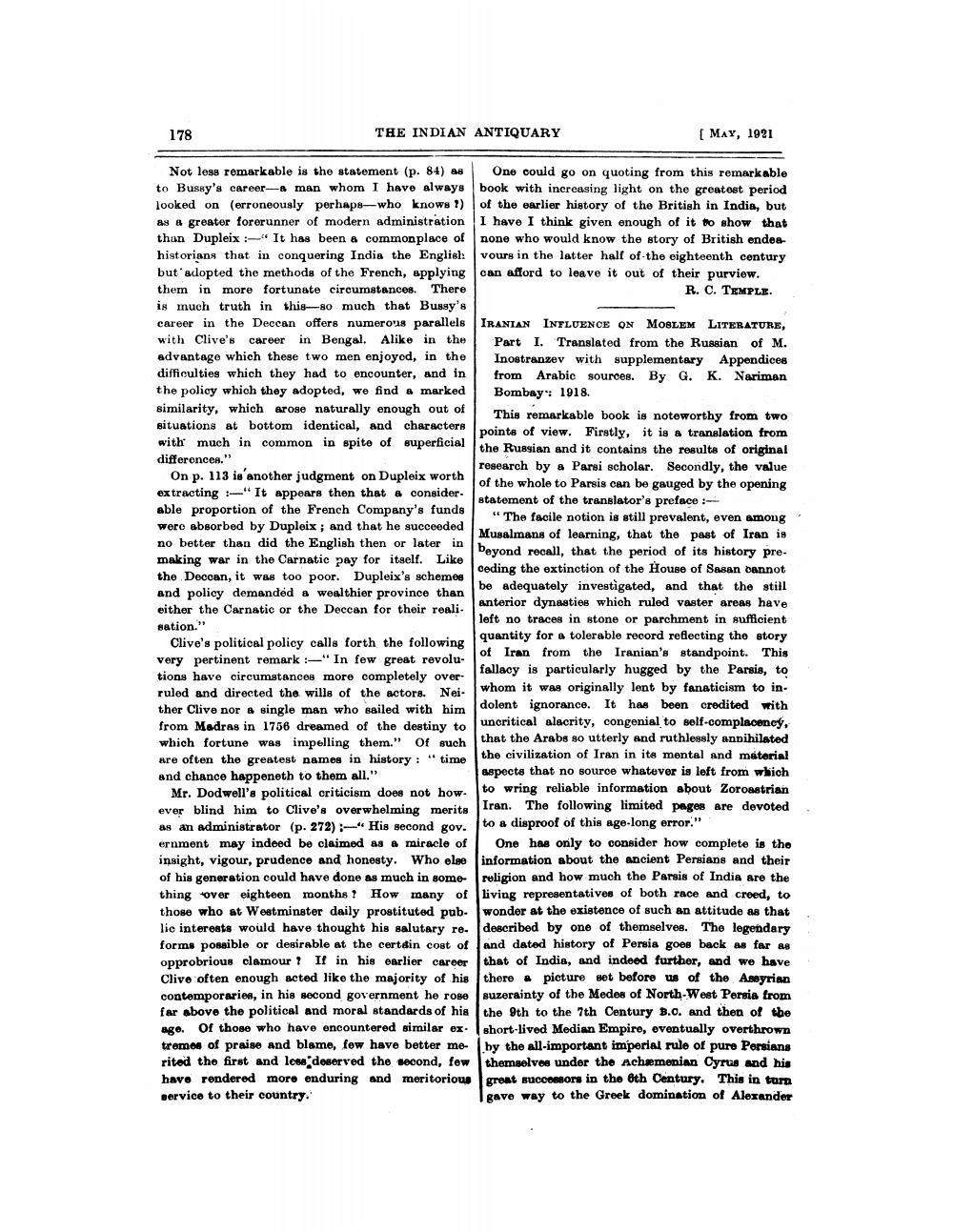________________
178
THE INDIAN ANTIQUARY
Not less remarkable is the statement (p. 84) as to Bussy's career-a man whom I have always looked on (erroneously perhaps who knows?) as a greater forerunner of modern administration than Dupleix:-" It has been a commonplace of historians that in conquering India the English: but adopted the methods of the French, applying them in more fortunate circumstances. There is much truth in this so much that Bussy's career in the Deccan offers numerous parallels with Clive's career in Bengal. Alike in the advantage which these two men enjoyed, in the difficulties which they had to encounter, and in the policy which they adopted, we find a marked similarity, which arose naturally enough out of situations at bottom identical, and characters with much in common in spite of superficial
differences."
On p. 113 is another judgment on Dupleix worth extracting "It appears then that a consider able proportion of the French Company's funds were absorbed by Dupleix; and that he succeeded no better than did the English then or later in making war in the Carnatic pay for itself. Like the Deccan, it was too poor. Dupleix's schemes and policy demanded a wealthier province than either the Carnatic or the Deccan for their realisation."
Clive's political policy calls forth the following very pertinent remark:-" In few great revolu tions have circumstances more completely overruled and directed the wills of the actors. Neither Clive nor a single man who sailed with him from Madras in 1756 dreamed of the destiny to which fortune was impelling them." Of such are often the greatest names in history: "time and chance happeneth to them all."
Mr. Dodwell's political criticism does not however blind him to Clive's overwhelming merits as an administrator (p. 272):-"His second gov. ernment may indeed be claimed as a miracle of insight, vigour, prudence and honesty. Who else of his generation could have done as much in some thing over eighteen months? How many of those who at Westminster daily prostituted public interests would have thought his salutary reforms possible or desirable at the certain cost of opprobrious clamour? If in his earlier career Clive often enough acted like the majority of his contemporaries, in his second government he rose far above the political and moral standards of his age. Of those who have encountered similar extremes of praise and blame, few have better merited the first and less deserved the second, few have rendered more enduring and meritorious service to their country.
[ MAY, 1921
One could go on quoting from this remarkable book with increasing light on the greatest period of the earlier history of the British in India, but I have I think given enough of it to show that none who would know the story of British endea vours in the latter half of the eighteenth century can afford to leave it out of their purview. R. C. TEMPLE.
IRANIAN INFLUENCE ON MOSLEM LITERATURE, Part I. Translated from the Russian of M. Inostranzev with supplementary Appendices from Arabic sources. By G. K. Nariman Bombay: 1918.
This remarkable book is noteworthy from two points of view. Firstly, it is a translation from the Russian and it contains the results of original research by a Parsi scholar. Secondly, the value of the whole to Parsis can be gauged by the opening statement of the translator's preface :
"The facile notion is still prevalent, even among Musalmans of learning, that the past of Iran is beyond recall, that the period of its history preceding the extinction of the House of Sasan cannot be adequately investigated, and that the still anterior dynasties which ruled vaster areas have left no traces in stone or parchment in sufficient
quantity for a tolerable record reflecting the story of Iran from the Iranian's standpoint. This fallacy is particularly hugged by the Parsis, to whom it was originally lent by fanaticism to indolent ignorance. It has been credited with uncritical alacrity, congenial to self-complacency, that the Arabs so utterly and ruthlessly annihilated the civilization of Iran in its mental and material aspects that no source whatever is left from which to wring reliable information about Zoroastrian Iran. The following limited pages are devoted to a disproof of this age-long error."
One has only to consider how complete is the information about the ancient Persians and their religion and how much the Parsis of India are the living representatives of both race and creed, to wonder at the existence of such an attitude as that described by one of themselves. The legendary and dated history of Persia goes back as far as that of India, and indeed further, and we have there a picture set before us of the Assyrian suzerainty of the Medes of North-West Persia from the 9th to the 7th Century B.C. and then of the short-lived Median Empire, eventually overthrown by the all-important imperial rule of pure Persians themselves under the Achæmenian Cyrus and his great successors in the 6th Century. This in turn gave way to the Greek domination of Alexander




